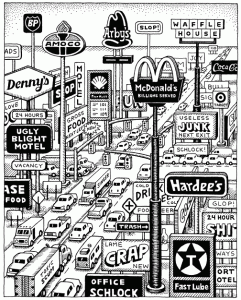The job of the executive director of the Metropolitan Planning Organization for our community is vacant, and we are dreaming of how nice it would be if we had someone like the one in Nashville. He actually feels that his job is to speak out against sprawl. Here, the MPO director can’t speak the total truth despite good intentions, because the small towns have a stranglehold on the organization.
As we’ve written before, beginning with “Is Memphis MPO Inherently Biased,” our MPO is one of the most unrepresentative in the entire nation. It’s overwhelming suburban and overwhelming white.
For those challenging the dual referenda requirement to consolidate city and county governments, here’s a target ripe for a federal lawsuit challenging the inequality and unfairness found in our present MPO. We’re overdue for reforming this crucial group, and more to the point, we’re overdue for the tail – the suburbs – to quit wagging the dog – Memphis.
Here’s what the Nashville MPO director had to say about sprawl and recent reports concluding that Nashville had the longest commutes:
The competing studies have unleashed disagreements between the two groups that issued them, but the Nashville Area Metropolitan Planning Organization says both are useful in seeking ways to keep traffic moving.
The most recent report, by CEOs for Cities, ranks Nashville and nearby counties as number one in the time motorists spend in their vehicles during peak traffic times, putting it well above Houston; Washington, D.C.; Atlanta; and Los Angeles.
“It’s pretty eye-opening and validating about our region,” he said.
The earlier report, an annual one by the Texas Transportation Institute called the Urban Mobility Report, has been the standard used nationwide for years as governments consider expanding road systems.
Its information about congestion — the speed of traffic and traffic snarls in an area — is cited frequently when money is sought to widen roads.
The CEOs for Cities report, analyzing 51 major metropolitan areas, emphasizes the importance of planning for development in a way that minimizes time spent on the roads.
“Both reports are extremely useful to us,” Skipper said.



Hey, that’s a spot-on depiction of Goodman Road by that cartoonist. Good job.
Most likely, we’ll get a lawyer who specializes in personal injury or bankruptcy as our next MPO Director. It’s an unfortunate reality that jobs such as this one far too often become nothing more than patronage positions.
If we really, really wanted the MPO to take a positive turn, we’d ask–no, we’d beg–for an experienced and strong-willed land use / transportation planner with a full understanding of sprawl both as a concept and as a local practice. Maybe we’d see if Mary Baker or Louise Mercuro were interested. Just a thought.
I’m sure that’s Summer ave, no wait, not a million title max, check advance, or pawn shops, so other than that, it’s about the same.
Sometimes I think this city ought to go on a scouting mission for every historically botched position, such as this one, and find THE most qualified person in the US and let them work and train a replacement for three years. That way at least everyone who comes after will have a clue from the best of the best instead of a handshake from a crony.